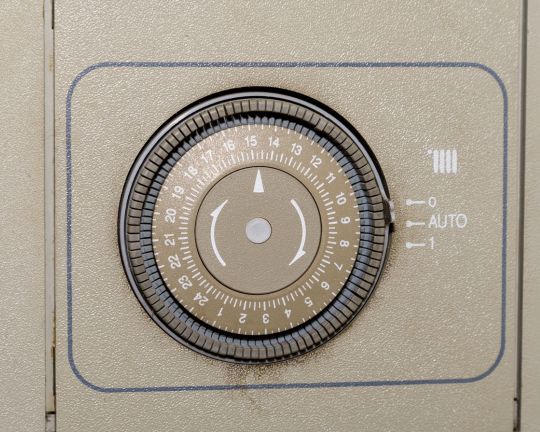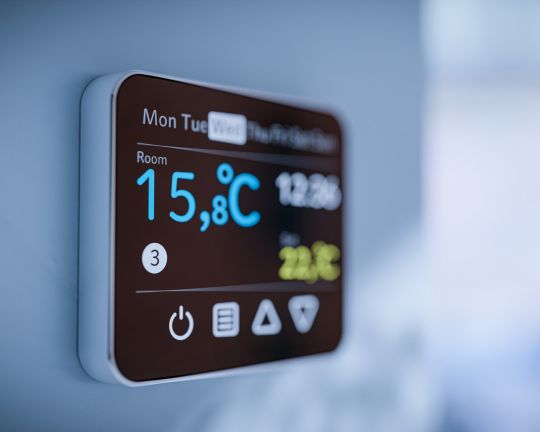Boiler how-to
How to set the timer on a boiler
22 Apr 2024 • 6 minutes


Heating and hot water are things all of us can take for granted at times, especially those in the household who aren’t footing the bill!
One way of making sure your heating is working more efficiently is by setting your boiler timer or digital timer.
If you have a modern boiler, you’re likely to have a digital timer or separate smart thermostat which will allow you to set a time. Older boilers may have what’s called an analogue timer. Whichever model boiler you have, we’ll cover it in this guide and let you know how setting your timer can bring you comfort and save you money.
A boiler timer allows you to set your boiler to turn on and off at specific times of the day. They’re a really useful way of using your boiler more efficiently, especially if you’re in and out of the house all day.
Usually people will set them to come on in the morning for a couple of hours while everyone gets ready for work or school and then again at the end of the day into the evening.
Like many modern appliances, switches and labels are usually marked up in a pretty obvious way, and boiler timers are no different. In most cases you’ll find a switch which will usually be labelled up with “timer” written on it.
When pressed, this switch will turn on at your chosen times. If this switch is turned off you’ll only have the option to turn your boiler on or off manually.
If you’re after how to set your boiler’s timer, scroll down to how to set your digital or mechanical timer below.
There’s a number of benefits that come with setting your boiler’s timer, but there are two that stand out above others.
For example, if you’re going on holiday or will be away from home for a longer period of time, you can use your boiler or thermostat controls to turn down the temperature or change your boiler to a more efficient setting to save money.
By default, using your heating less will reduce the amount of energy you use and make your home more energy efficient.
Planning what time your boiler comes on means you won’t have to worry about accidentally leaving it on, which is a convenience that we could all do with in our lives.

Modern boilers (and even some older models) will have a digital timer. You can set this by following the 3 simple steps below:
First you need to make sure that your digital timer is set to the right date and time. This can be done automatically, but it’s best to check and make sure so your boiler will turn on at that time you choose.
Once you’ve set the right time, you can switch to scheduling mode. This will then allow you to set the times your boiler will turn on and off.
Once you’ve done this, you can choose when you want the boiler to turn on. This will then let you pick the times you want the boiler to come on.
For example, you can set your boiler to come on at 6.30am to 8.00am and 17.30pm to 20.00pm to keep you and your family toasty at home.
If you have an older boiler, you may find that your timer is mechanical. A mechanical timer often looks like a dial with numbers around it, like a traditional cooking timer. If this is the case, you can follow these 3 steps to get your boiler timer working.
On your mechanical timer, it’s important to make sure that the dial arrow is pointing to the right time. As daylight saving changes you will need to keep on top of the time as you’ll have to set this manually.
To set the times on your mechanical timer you need to press in the pins around the dial to let your boiler know what time you want it to come on.
For example, if you want your boiler on from 6.30am to 8.00am, you need to push in the pins around that time to make sure your heating comes on at the time you’d like it to.
Once you’ve used the pins on the timer, you then need to switch on the mechanical timer. This switch is usually helpfully labelled ‘timer’ and it will make your boiler turn on at the times you have chosen on the dial.
If this switch is turned off, you’ll only be able to turn your boiler on and off manually.
As with all technology, boiler timers can sometimes go wrong. There’s a few reasons why this might happen, often these can be fixed with a bit of DIY but sometimes it can be a little more complicated.
One common reason for a boiler timer not working could be a blown fuse, which is often located in a spur close to the boiler. If you think the fuse has blown, then you may need to replace the fuse. If you have the right skills and knowledge, you can check the current fuse and install a like-for-like replacement using a screwdriver.
With most modern boilers or remote timers this shouldn’t be a problem, as you’ll find that your timer will do this automatically. But if your boiler is an older model, you’ll probably need to set the clocks yourself.
If your home has recently had a power outage, you’ll want to make sure your boiler timer is still showing the correct time. Most digital timers will have a backup battery pack to keep time despite a power outage, but older clocks and timers may need to be reset if the power has been off for some time.
If you have tried each of these things and none of them work, then you could be looking at a broken boiler timer. If this is the case then you’ll need a qualified heating engineer or electrician to look at it for you.
If you are looking for a local engineer, you can contact our repairs service where you can book someone to come out to you.
Top tip: This may seem like an obvious one, but if you have set your thermostat to a lower temperature then you won’t feel it. You can easily sort this by putting the thermostat on a higher temperature.
Whether it’s a one off repair to get a problem like a broken timer fixed or you’re looking for a new boiler, we’re on hand to help 24 hours a day, every day of the year.
You may also be interested in our boiler and central heating cover that will protect your boiler against breakdowns and repairs, giving you peace of mind when you need it most.
Our help & advice articles cover Plumbing, Home heating, Electrical, Energy-saving and Home maintenance.